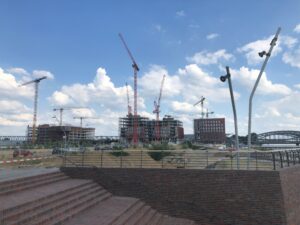Julius Benthin ’23 Conducts Research on HafenCity Development in Hamburg
Julius Benthin is a senior urban studies and economics double major who recently presented his research on the HafenCity development in Hamburg with a grant received as a Marcuss Fellow. His inspiration for the project came when he was living in Hamburg, Germany during the pandemic and taking walks through HafenCity as a break from online classes. He began his research on the urban redevelopment project in April of 2022 and is currently working to finish his senior thesis for urban studies on the topic.
Benthin is one of Trinity’s inaugural recipients of the Rosemary and Stan Marcuss ’63 Fellowship for Research in Urban Studies. The Marcuss Fellowship awards two Trinity students stipends of $4,000 each at the end of their junior year to conduct research as part of their senior honors theses. The other recipient of the 2022-23 Marcuss Fellowship is Kendra Keelan ’23. Keelan focused on academic and institutional community engagement at Trinity College and nine other small, selective higher education liberal arts institutions.
The HafenCity redevelopment is Hamburg’s “icon” project, a major urban project that aimed to and succeeded in garnering global attention. When Benthin was researching the changes seen in HafenCity he looked at news reports, conducted interviews, read documents about the project, and experienced the reimagined urban environment by walking the streets.

Benthin has a personal connection to the project as he was living in Hamburg at the time of development and worked in the concert hall which is the flagship building that came out of the project. Benthin describes the concert hall as symbolic of the HafenCity overall. The project went over budget and cost the citizens of Hamburg tax money for this extravagant building. However, Benthin says that “the city made sure that everyone be given a chance to go there, and the people come in and they are all amazed”. In the beginning, there were doubts about the impact and the cost of the project, but since its completion, it has transformed the area of the harbor and the city.
During the research process, Benthin grappled with finding a starting point. He describes that “in the beginning, you have a lot of ideas and need to organize them”. He credits Professor Chen, his faculty mentor, for helping him navigate the beginning steps of the research process and letting him have the freedom to pursue what interests him.

Throughout the whole experience, Benthin felt rewarded when walking through the HafenCity, saying, “It’s not just this construction site, it’s actually a living district, and you experience the first new developments of the community”. His favorite parts of the research process were walking through HafenCity and observing the evolution of the project as well as having informal conversations with residents about their opinions on HafenCity.
The most surprising element of the research was the scale and impact of HafenCity. The implementation of a large redevelopment project, like HafenCity, is not specific to Hamburg but is a global phenomenon. Benthin was excited that his research of HafenCity could result in publishing a paper that could further the conversation of large-scale urban development projects.
As Benthin works to finish his thesis on his research of the HafenCity, he is looking forward to graduation and is grateful for his experience as a Marcuss Fellow and the research he conducted in Hamburg.
